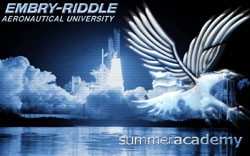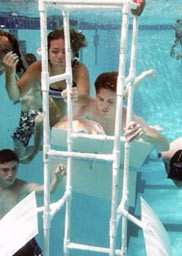Runs June 13th To August 9th
 From building a mock space station
to learning to fly, teen-agers will have a blast at the Summer
Academy operated by Embry-Riddle Aeronautical University at its
Daytona Beach campus.
From building a mock space station
to learning to fly, teen-agers will have a blast at the Summer
Academy operated by Embry-Riddle Aeronautical University at its
Daytona Beach campus.
The Summer Academy, which will run from June 13 to Aug. 9,
offers educational programs for students ages 12-18 who want to
learn about aviation and aerospace in a fun, relaxing atmosphere.
This year's courses, some of which may be taken for college credit,
are Aerospace I, Aerospace II, Aviation Career Exploration,
Aviation Discovery for Women, Flight Exploration, Generations, and
SunFlight. Application is required a month before the start date of
each camp.
Summer Academy programs include housing in an Embry-Riddle
student dormitory, on-campus meals, classroom instruction, and
educational materials. Students in some camps will take field trips
that may include Kennedy Space Center, Orlando Science Center,
Fantasy of Flight, a major theme park, and a water park.
Transportation for off-campus activities is provided by
Embry-Riddle.
Aspiring astronauts and scientists learn about NASA programs,
space shuttle operations, and the history of space flight in
Aerospace I. The course fosters a basic understanding of space and
space technology through field trips, guest speakers, and classroom
lectures. Students design and build two space-station models, one
on land and one in a zero-gravity environment. The program runs
June 20 to July 13. Tuition is $3,800.
Aerospace II provides an overview of US and international space
programs, focusing on the Earth and its environment, methods of
scientific exploration, and spacecraft-payload criteria at the
introductory physics level. The course includes hands-on
activities, labs, and classroom instruction. The program runs July
17 to Aug. 6. Tuition is $3,800.
In Aviation Career Exploration, students use state-of-the-art
simulation devices to sample various aspects of aircraft
maintenance, air traffic management, engineering, flight, human
factors, meteorology, and space technology. Also included are field
trips, guest speakers, labs, and classroom instruction. Two
sessions are available: July 10-16 or July 31 to Aug. 6. Tuition is
$975.
 Industry professionals teach the
Aviation Discovery for Women course, designed for female students
ages 15-18 with an interest in aviation and aerospace. Topics
covered are current developments and career possibilities in
aircraft maintenance, air traffic management, engineering, flight,
meteorology, and space technology. The program runs July 17-30.
Tuition is $2,800.
Industry professionals teach the
Aviation Discovery for Women course, designed for female students
ages 15-18 with an interest in aviation and aerospace. Topics
covered are current developments and career possibilities in
aircraft maintenance, air traffic management, engineering, flight,
meteorology, and space technology. The program runs July 17-30.
Tuition is $2,800.
Flight Exploration is an introduction to flying and flight
training in which students practice flight maneuvers and get
acquainted with how an airplane responds to cockpit commands.
Participants also learn how to comply with aviation regulations and
how to analyze weather conditions. The course includes field trips,
flight and ground lab instruction, and a logbook to record flight
hours. Three sessions are available: June 13-17 (no campus housing
available), June 20-26, or July 24-30. Tuition is $1,800.
The Generations program allows a parent/child or
grandparent/grandchild pair to share experiences as they learn
about aircraft maintenance, air traffic management, flight,
meteorology, and space technology. The program runs July 24-30.
Tuition is $1,800 per pair and includes flight fees, simulator
sessions, field trips, classroom instruction, and materials.
Three SunFlight programs offer flight instruction. Tuition
includes field trips, ground lab, classroom instruction, books,
materials, and a deposit toward flight fees.
In the SunFlight Solo Camp, the goal is for all qualified
students to solo by the end of the program. The course runs July 17
to Aug. 6. Tuition is $4,500.
Students in the SunFlight Private Pilot Camp earn a private
pilot certificate. The program runs June 20 to Aug. 9. Tuition is
$15,000.
In the SunFlight Multi-Engine Camp, participants earn a
multi-engine land rating. The program runs July 10 to Aug. 9.
Tuition is $12,500.
 ANN's Daily Aero-Linx (04.13.24)
ANN's Daily Aero-Linx (04.13.24) ANN's Daily Aero-Term (04.13.24): Beyond Visual Line Of Sight (BVLOS)
ANN's Daily Aero-Term (04.13.24): Beyond Visual Line Of Sight (BVLOS) Airborne 04.09.24: SnF24!, Piper-DeltaHawk!, Fisher Update, Junkers
Airborne 04.09.24: SnF24!, Piper-DeltaHawk!, Fisher Update, Junkers Aero-News: Quote of the Day (04.14.24)
Aero-News: Quote of the Day (04.14.24) ANN's Daily Aero-Term (04.14.24): Maximum Authorized Altitude
ANN's Daily Aero-Term (04.14.24): Maximum Authorized Altitude




